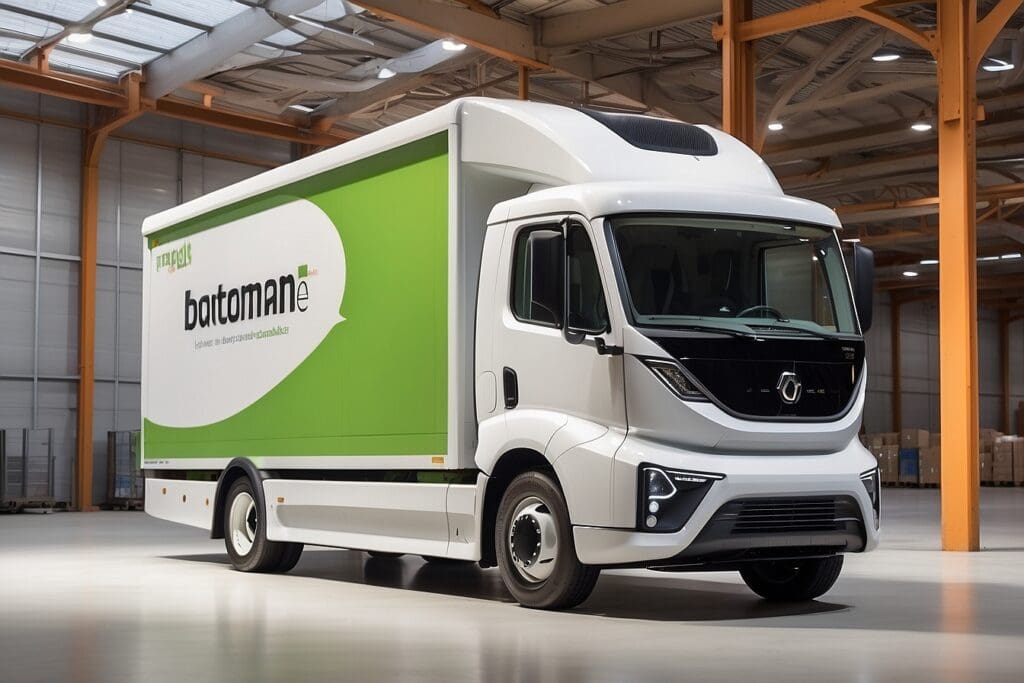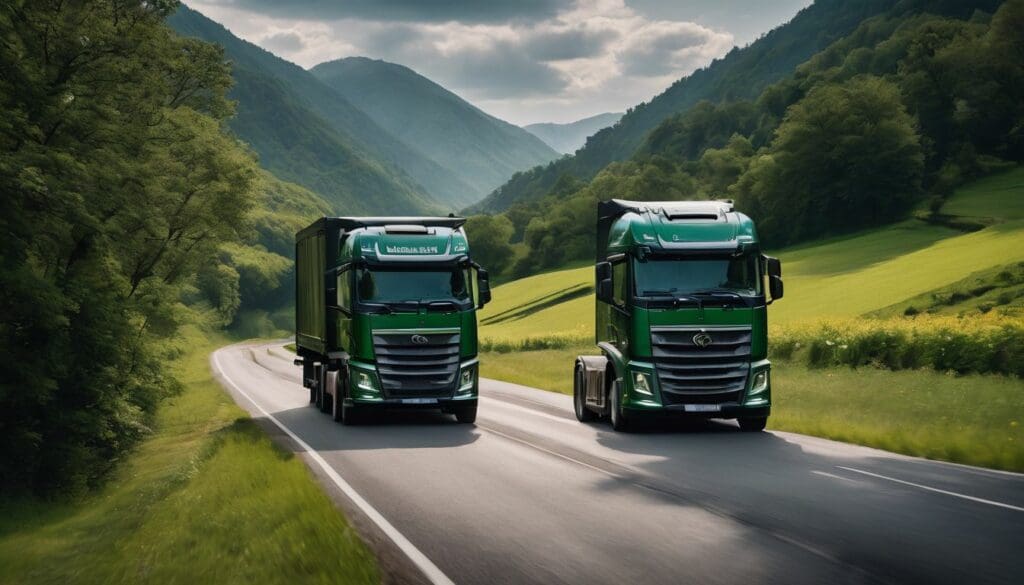Transporting goods can often carry a hefty environmental price tag, an issue many of us are striving to tackle. We’ve certainly felt the ripples of this challenge, and with lorries representing a sizeable chunk of global carbon emissions, seeking greener alternatives has become imperative.
That’s precisely why we’re keenly exploring the potential of electric lorries to drive sustainable logistics forward, promising cleaner journeys and brighter horizons. Come along as we embark on this energising voyage!
Key Takeaways
- Electric trucks reduce greenhouse gas emissions and air pollution, contributing to a cleaner environment.
- Switching to electric trucks can lead to significant cost savings for businesses in fuel and maintenance costs.
- Advances in battery technology and charging infrastructure are making electric trucks more viable for long-haul transportation.
- Collaboration between government, industries, and energy providers is essential for developing the necessary infrastructure for electric trucks.
- Major companies are adopting electric trucks into their fleets as part of their commitment to sustainable logistics.
What are Electric Trucks and How Do They Work?

Electric trucks are a type of freight vehicle that run on electric motors and rechargeable batteries instead of traditional fuel. They work by using the stored energy in their batteries to power the electric motor, which then drives the wheels.
This makes them more environmentally friendly and sustainable compared to traditional diesel trucks.
Definition of electric trucks
Electric trucks are commercial vehicles powered not by diesel or petrol but by electricity. They use large batteries to store energy, which turns electric motors and propels the truck forward.
Instead of refuelling at a petrol station, these trucks need to be charged at charging stations or using special equipment that can be installed at depots or homes.
As we embrace cleaner transportation alternatives, battery electric trucks stand out in the heavy-duty vehicle market for their zero emissions during operation. They represent a significant leap towards slashing greenhouse gases and reducing our carbon footprint.
By transitioning road logistics from traditional fuel to electrified transportation, we’re paving the way for greener logistics and more sustainable transport solutions.
Components of electric trucks
- Battery pack: Electric trucks are powered by a large battery pack, which stores energy for the vehicle’s operation.
- Electric motor: Unlike traditional trucks with internal combustion engines, electric trucks use an electric motor for propulsion.
- Charging system: This includes the plug-in port and onboard charger, allowing the vehicle to be charged from various power sources.
- Regenerative braking system: Electric trucks utilise regenerative braking to recover energy during deceleration, which is then used to recharge the battery.
- Thermal management system: To maintain optimal temperature conditions for the battery and other critical components, electric trucks incorporate a thermal management system.
How they differ from traditional trucks
Electric trucks differ from traditional trucks in several key ways. Firstly, instead of relying on internal combustion engines, electric trucks are powered by electricity stored in onboard batteries.
This means they produce zero emissions during operation, contributing to cleaner air and a reduction in greenhouse gas emissions. In addition, electric trucks have fewer moving parts than traditional trucks, leading to lower maintenance costs over time and reduced reliance on fossil fuels for power.
Another significant difference lies in the driving experience; electric trucks operate quietly compared to their traditional counterparts which can contribute positively to reducing noise pollution.
Advantages and Disadvantages of Electric Trucks
Electric trucks offer reduced carbon footprint and lower fuel costs, making them a greener alternative for sustainable logistics. However, they also have limited driving range compared to traditional trucks.
Reduced carbon footprint
Electric trucks play a vital role in reducing carbon emissions, contributing to cleaner air and a healthier environment. By using electric trucks, we can significantly lower the greenhouse gas emissions produced by traditional diesel vehicles.
This helps to combat climate change and reduce our overall impact on the planet, making it easier for us to embrace sustainable transportation solutions.
Transitioning from conventional freight vehicles to electric trucks is an essential step towards achieving eco-friendly logistics and cleaner transportation systems. The reduced carbon footprint of electric trucks aligns with our commitment to minimising environmental harm while still meeting our logistical needs effectively.
Lower fuel costs
Electric trucks offer a significant advantage with lower fuel costs, contributing to more cost-effective and sustainable logistics operations. With the shift towards electric vehicles, companies can benefit from reduced expenditure on traditional fuels such as diesel or petrol.
This financial saving not only supports the bottom line but also aligns with environmentally conscious efforts to reduce greenhouse gas emissions for cleaner transportation.
By utilising electric trucks, businesses can contribute to a greener future while enjoying direct economic benefits through decreased fuel expenses. This reduction in reliance on fossil fuels further supports sustainable logistics by promoting energy efficiency and reducing carbon footprints.
Lower maintenance costs
Electric trucks offer the advantage of lower maintenance costs, making them a cost-effective and sustainable option for logistics companies. With fewer moving parts than traditional diesel trucks, electric vehicles require less frequent servicing, reducing downtime and repair expenses.
This not only contributes to environmental conservation but also offers long-term economic benefits for businesses investing in clean transportation technologies.
Ensuring the operational efficiency of electric trucks can lead to significant savings on maintenance, aligning with the goals of environmentally conscious individuals seeking eco-friendly transportation solutions.
Limited driving range
When considering the adoption of electric trucks, it’s essential to acknowledge the limitation of driving range. While traditional diesel trucks can cover long distances without refuelling, electric trucks currently have a more restricted range on a single charge.
This challenge is being addressed through advancements in battery technology and charging infrastructure development.
Companies are investing in research and development to enhance the energy density of batteries, allowing for longer driving ranges on a single charge. Moreover, initiatives to expand the network of fast-charging stations across major transportation routes are underway, aiming to minimise downtime for recharging.
The Growing Role of Electric Trucks in Sustainable Logistics
Major companies are increasingly implementing electric trucks in their fleets to reduce their carbon footprint and lower fuel costs. This shift towards sustainable logistics is having a positive impact on the environment and is being supported by government incentives and policies.
Implementation by major companies
- Companies such as Amazon, UPS, and DHL have integrated electric trucks into their fleets to reduce their carbon footprint and comply with environmental regulations.
- By transitioning to electric trucks, these companies aim to lower their fuel costs significantly while contributing to cleaner air and reducing noise pollution in urban delivery areas.
- The adoption of electric trucks aligns with their sustainability goals, demonstrating a commitment to eco-friendly transportation solutions that support conservation efforts.
- This move also reflects a response to increasing consumer demand for products delivered through sustainable logistics practices, encouraging other businesses in the sector to follow suit.
- As more major players embrace the use of electric trucks, it fosters an environment conducive to technological innovation and advancements in clean energy initiatives within the commercial vehicle electrification sector.
Impact on the environment
Electric trucks play a crucial role in reducing greenhouse gas emissions and promoting eco-friendly transportation. By relying on battery electric technology, these vehicles contribute to lower carbon footprints, supporting the use of renewable resources for energy.
Their implementation by major companies brings positive changes in logistics, aligning with government incentives and policies that encourage sustainability in transportation. As environmentally conscious individuals, it’s essential to support the growing market of electric trucks and their impact on reducing GHG emissions.
Furthermore, the increasing availability of electric vehicle infrastructure complements this shift towards alternative energy usage in the logistics sector. Collaborating with other industries helps create a more sustainable supply chain network.
Government incentives and policies
The government offers various incentives to promote the adoption of electric trucks, such as tax credits and grants for purchasing and installing charging infrastructure. These policies aim to incentivise companies to invest in eco-friendly transportation options, reducing carbon emissions and promoting sustainable logistics.
Additionally, governments are also implementing regulations that encourage the use of electric trucks, such as emission standards and access restrictions in urban areas to support the growth of battery electric vehicles within the transport sector.
To further accelerate the transition to electric trucks, policymakers are collaborating with industry stakeholders to develop comprehensive strategies that address infrastructure challenges and facilitate a seamless integration of electric vehicles into logistic operations.
Overcoming Challenges and Future of Electric Trucks
Improvements in technology are paving the way for electric trucks to overcome their limited driving range and become a more viable option for sustainable logistics. Furthermore, collaboration with other industries and infrastructure development are key factors that will shape the future of electric trucks in transportation.
Improvements in technology
Improvements in technology have led to increased efficiency and reliability of electric trucks. Advancements in battery technology have extended driving ranges, making electric trucks more suitable for long-haul transportation.
Moreover, developments in charging infrastructure, such as fast-charging stations along major transport routes, have significantly reduced the downtime associated with recharging. These improvements address one of the primary concerns about electric trucks and pave the way for their widespread adoption in sustainable logistics.
Looking ahead, continued research and development into lightweight materials and aerodynamic designs will further enhance the performance of electric trucks. These advancements aim to maximise energy efficiency and minimise environmental impact while meeting the growing demands of ecofriendly transportation.
Infrastructure development
Electric trucks are rapidly gaining popularity, but their success relies heavily on the availability of charging infrastructure. Developing a robust network of charging stations along major transportation routes is essential to support the widespread adoption of electric trucks.
This includes installing charging stations at distribution centers, warehouses, and truck stops to ensure seamless long-haul operations. Moreover, the expansion of renewable energy sources like solar and wind power will be crucial in providing clean and sustainable electricity for these charging stations.
As stakeholders in sustainable logistics, we must advocate for increased investment in infrastructure development to facilitate the transition to electric trucks. This involves collaborating with government agencies, private businesses, and energy providers to accelerate the establishment of an extensive charging infrastructure across urban and rural areas alike.
Collaboration with other industries
Electric truck manufacturers are collaborating with other industries to build a comprehensive support network. These partnerships aim to develop charging infrastructure, battery technology, and renewable energy sources.
By working together, the electric vehicle market can continue to grow and provide sustainable logistics solutions for the future.
Furthermore, collaboration with other industries will lead to advancements in supply chain optimisation and telematics technology. These developments will ensure that electric trucks become an integral part of environmentally friendly transportation networks.
Conclusion
In conclusion, electric trucks play a crucial role in sustainable logistics. They offer a lower carbon footprint and reduced fuel costs, benefiting both the environment and businesses.
As major companies continue to implement them and governments provide incentives, the impact on the environment will undoubtedly grow. Overcoming challenges through technological improvements and infrastructure developments will pave the way for a future where electric trucks are indispensable in sustainable logistics.
FAQs
1. What is the role of electric trucks in sustainable logistics?
Electric trucks play a key role in sustainable logistics by reducing carbon emissions and helping companies transport goods in a more eco-friendly way.
2. Are electric trucks as powerful as diesel ones for logistics purposes?
Yes, modern electric trucks are designed to match the power and efficiency of diesel trucks while being better for the environment.
3. Can switching to electric trucks improve a company’s environmental impact?
Definitely! By using electric trucks, companies can greatly lessen their ecological footprint, contributing positively to sustainability efforts.
4. How does the use of electric trucks support future sustainability goals?
The adoption of electric trucks aids long-term sustainability objectives by lowering greenhouse gas emissions and paving the way towards cleaner transportation options in logistics.





